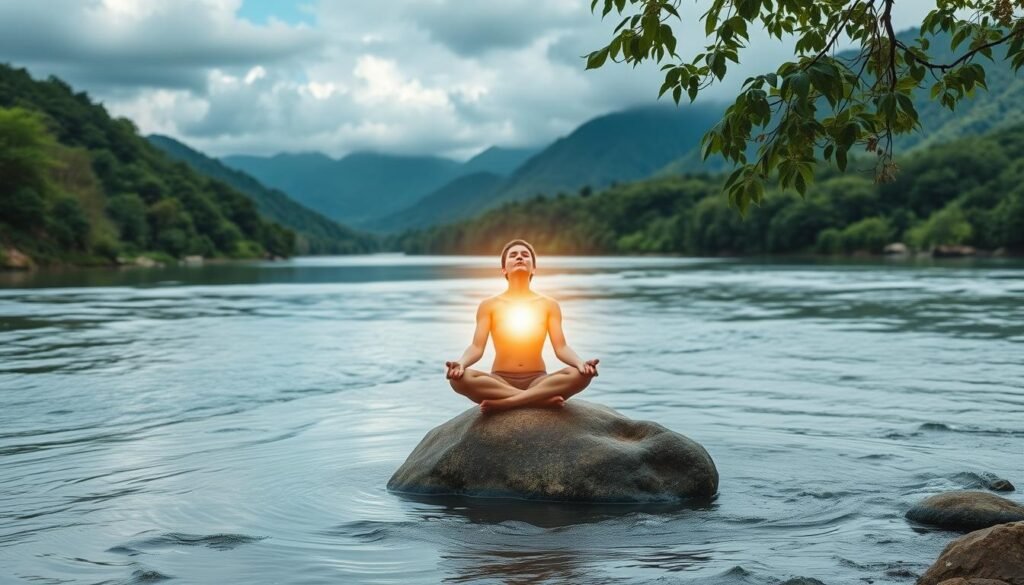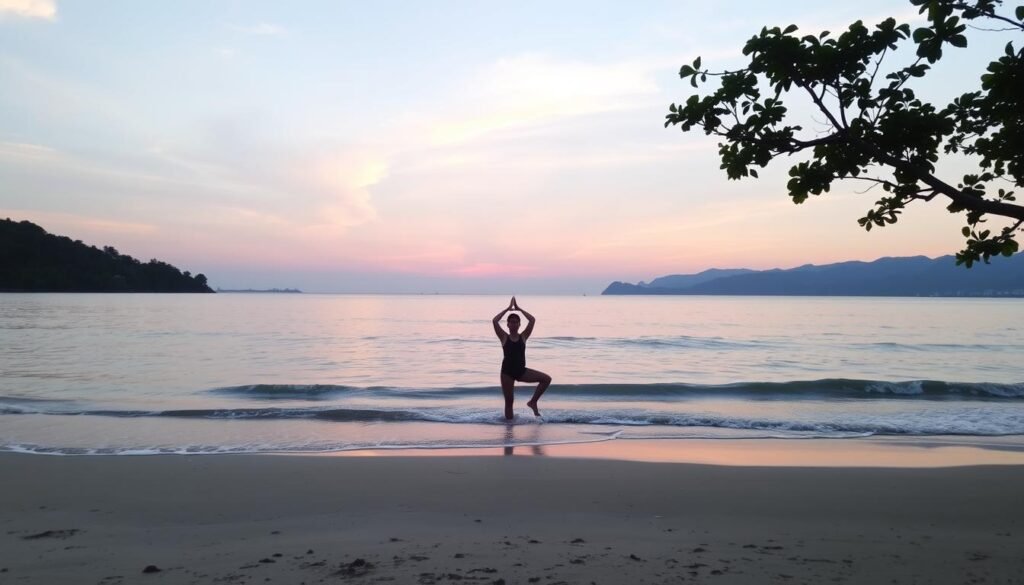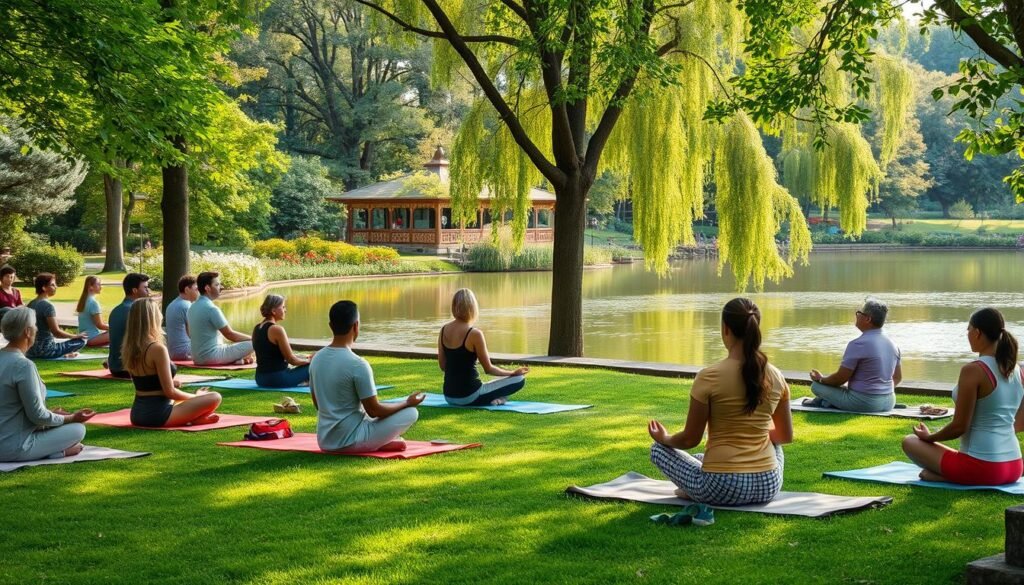About 40 million adults in the U.S. suffer from anxiety disorders. This big number shows a deep need for anxiety relief methods. In our busy lives, many look for ways to find inner peace. They want to lessen feelings of fear and worry. Meditation is a key relaxation technique for stress. It’s proven to reduce the size of the amygdala. That’s the brain part that handles fear, helping with stress management.
The Mayo Clinic says meditation is easy and available for all. It’s more than just relaxing. It’s a way to get better mental health. By focusing on now, meditation lowers stress. This helps people find balance and peace again.
Meditation is becoming more popular for managing anxiety. This guide talks about the top meditation techniques for anxiety. It shows how to add these practices to your day.
Key Takeaways
- Anxiety affects around 40 million adults in the U.S.
- Meditation can shrink the amygdala, aiding in anxiety management.
- Accessible meditation practices can be done anywhere, offering ease of use.
- Mindfulness practices connect the mind to the body for stress relief.
- Regular meditation can improve overall mental health and emotional stability.
Understanding Meditation
Meditation is a powerful tool for better awareness and relaxation. It changes how we handle stress and anxiety. It teaches ways to control our thoughts. Meditation started around 1500 BCE in Indian Vedantism. Since then, Buddhism and Taoism have also shaped it. Now, there are many different methods to try.
To get meditation, think of it as focusing your mind. This focus helps remove distracting thoughts. Stress and anxiety lessen. There are types like mindfulness and transcendental meditation. They improve our mental and physical health. A study in 2014 showed these kinds of meditation can really help. They reduce symptoms of anxiety and depression.
Meditation helps us live in the now, not worry about past or future. This reduces anxiety and increases acceptance. Studies show meditation really does improve our mental health. There are many meditation types to fit everyone’s needs. So, anyone looking to feel better can give it a try.
Benefits of Meditation for Anxiety
Meditation greatly helps with managing anxiety and boosts emotional health. It brings a peace of mind that lessens stress. Those who meditate often find their emotional health getting better, which improves their overall health.
Research highlights meditation’s role in boosting emotional health. A study with 1,500 college students showed that mindfulness meditation reduces anxiety. It helps people notice their anxiety without panic, allowing them to stay calm in tough times.
Mindfulness meditation helps reduce anxiety symptoms and stress. Participants in studies felt less stressed than those who didn’t meditate. Deep breathing in guided meditation activates a calming response, reducing anxiety.
Meditation regularly can change the brain in good ways. It affects areas that control emotions, making it easier to handle stress and fear. A study in 2020 found just 5 to 12 minutes of daily meditation makes a difference. This was seen in college students.
Body scan meditation lowers cortisol, a hormone linked to stress, anxiety, and depression. Studies show meditating daily can greatly improve your emotional health and make you more resistant to anxiety.
To learn more about meditation’s benefits, check out this resource. Meditation not only helps handle anxiety in the moment but also leads to lasting mental health improvements.
Top Meditation Techniques for Anxiety Relief
Meditation offers many ways for those looking for anxiety relief. Each method can be tailored to what a person likes and can provide great benefits for anxiety management. Here are some effective ways to meditate for anxiety relief.
Guided Meditation: In this technique, a person listens to a guide take them on a meditation journey. Studies show that mantra-based meditation can reduce anxiety slightly to moderately. This makes a person feel calm. It’s great for beginners who might find meditating on their own hard.
Mindfulness Meditation: This method is about being in the moment and accepting thoughts and feelings without judging them. A study in 2014 showed that mindfulness-based stress reduction (MBSR) helped people do better on mental health tests. This shows it’s effective for relieving anxiety.
Breathing Meditation: Focusing on controlling your breathing helps shift attention from what causes anxiety. The SKY Breath Meditation is one structured breathing method. Studies have found it can lead to better results than MBSR. People felt better overall, with less depression and stress.
| Technique | Key Benefits | Study Findings |
|---|---|---|
| Guided Meditation | Ease of entry for beginners, promotes calmness | Small to moderate decreases in anxiety |
| Mindfulness Meditation | Improved psychological well-being | Significant improvements in psychological tests |
| SKY Breath Meditation | Immediate and long-term anxiety relief | Reductions in cortisol levels by up to 78% |
Trying out these meditation techniques can give people tools to handle anxiety well. Each method has its own way of leading to peace and better mental health.
Meditation Technique for Anxiety
Meditation is great for easing anxiety and helping you relax. There are three main types: guided, mindfulness, and breathing meditation. Each type has a special way to lower stress and help you focus better.
Guided Meditation
Guided meditation involves following instructions from a guide or teacher. They use guided meditation scripts to lead you through calming scenes. It’s especially good for beginners wanting to find peace from anxiety quickly. Imagining these peaceful scenes helps reduce stress and clear your mind.
Mindfulness Meditation
Mindfulness meditation teaches you to observe your thoughts and feelings without judging them. It focuses on living in the moment. This reduces anxiety by keeping your mind from wandering to worries. Regular mindfulness makes you mentally stronger. It helps you act with purpose.
Breathing Meditation
Breathing meditation focuses on your breath to calm your mind. Paying attention to how you breathe reduces anxiety and stress. It makes you more aware of how you feel emotionally. Making this a daily habit can sharpen your focus and improve how you deal with stress.
| Meditation Technique | Focus | Benefits |
|---|---|---|
| Guided Meditation | Following a teacher | Immediate stress relief, improved relaxation |
| Mindfulness Meditation | Aware presence | Enhanced mental resilience, reduced anxiety |
| Breathing Meditation | Concentration on breath | Increased self-awareness, better emotional regulation |
Using these meditation methods daily can greatly improve your mood and mental health. Learn more techniques to fight anxiety and beef up your stress management skills.
Incorporating Mindfulness Exercises
Adding mindfulness exercises to your daily life can really help with anxiety. These activities teach us to live in the moment. This is key for lowering stress and feeling more relaxed. Techniques like calming breaths and focusing on your body can improve your well-being.
Breathing Exercises
Breathing exercises are a big part of mindfulness. Deep breathing helps you handle your anxiety by calming your body down. It slows down your heart rate and lowers your blood pressure. Just a few minutes of these exercises every day can make a big difference.
Body Scanning Techniques
Body scanning is another great mindfulness exercise. It lets you pay attention to different parts of your body. You notice any discomfort or tension. Letting go of this tension helps you relax deeply. Doing body scans often can help you control your emotions and reduce anxiety over time.
Calming Breathing Practices
Breathing exercises are key for those looking for anxiety relief. The 4-7-8 Method and Diaphragmatic Breathing are both standout methods. They help bring calm and emotional balance.
The 4-7-8 Method
The 4-7-8 Method follows a simple breathing pattern. You inhale for four seconds, hold for seven, then exhale for eight. It’s a great way to control your breath and ease anxiety. With regular practice, it can really help lower stress and boost relaxation.
Diaphragmatic Breathing
This technique lets you breathe deeply using your diaphragm. It’s good for efficient breaths that relax you. It activates the relaxing part of your nervous system. Try doing it for 10 minutes, three to four times daily. Soon, it’ll become a go-to way to handle stress.

Making these breathing techniques part of your day can really help with anxiety. Stick with them to feel their full benefits.
| Breathing Technique | Duration | Benefits |
|---|---|---|
| 4-7-8 Method | 8 seconds | Tranquilizes the nervous system, reduces anxiety |
| Diaphragmatic Breathing | 10 minutes | Stimulates relaxation, encourages deep breathing |
| Pursed-Lip Breathing | As needed | Improves lung function, provides stress relief |
Learning about calming breathing techniques can change your approach to anxiety relief. To further help your mental health, look into cognitive-behavioral techniques. These can complement your breathing exercises nicely.
Utilizing Meditation Apps for Anxiety
In today’s world, many apps help with stress through meditation. They make mindfulness easy to reach for everyone. These platforms have everything for beginners and those who’ve meditated before. You can find popular apps like Headspace and Calm leading the wellness industry. They get lots of positive reviews and people really engage with them.
Calm is huge in health apps and helps users find peace. Ten Percent Happier has more than 500 videos but charges an annual fee. For flexible options, Core Meditation by Hyperice starts with a free two-week trial, then it’s pretty affordable each month.
Headspace is super user-friendly with a free trial for seven days. It’s great for trying out meditation. The Mindfulness App lets people start without spending, thanks to its free version. It’s good for fitting mindfulness into your day.
There are apps like EXHALE for BIWOC users, and Sowlmate for the LGBTQ+ community. Simple Habit offers quick stress relief sessions. Sattva brings mantra and chants into the mix. There’s a wide range of apps for anyone’s needs.
These apps are not just easy to use. They also help make meditation a regular part of life. Many people who meditate often use these apps. It shows a real effort to bring mindfulness into everyday life, even when busy.
Yoga for Anxiety Reduction
Yoga combines physical activity with mental mindfulness, making it great for reducing anxiety. Research shows yoga greatly lowers stress and anxiety levels. A 2017 study found a single hatha yoga session could reduce stress after a tough situation. Participants felt less stressed, their blood pressure dropped, and they felt more confident. Yoga helps manage emotions and improves overall happiness.
Yoga Poses for Relaxation
Certain yoga poses are great for easing tension and calming your thoughts. Child’s Pose, Cat-Cow Stretch, and Forward Fold are top picks. These poses ground the body and bring peace. Practicing regularly helps handle stress better and stabilizes emotions.
Integrating Meditation into Yoga Practice
Adding meditation to yoga increases its stress-relieving effects. Yoga Nidra, a guided meditation, helps reduce stress and betters sleep. Using items like mats, blocks, and straps enhances comfort and focus. Pranayama, or controlled breathing, also aids in calming the mind. Combining yoga with meditation promotes mental clarity and emotional steadiness.

Finding the Right Meditation Retreats for Anxiety
When looking for the best meditation retreats for anxiety, think about several things. You want a place that feels calm, with knowledgeable teachers, and a supportive group of people. The location, cost, and how long the retreat lasts are also key factors.
There are many spots in the United States for those wanting to find inner peace through meditation. You can find quiet places in California or peaceful areas in Florida and New York. States like Arizona and Colorado are also great choices because nature there helps with meditation.
How much you’ll spend is important to consider. For example, the Esalen Institute has workshops costing between $540 to $8,000, depending on what they offer. Spirit Rock Meditation Center uses a pay-what-you-can plan from $140 to $22,400. Meanwhile, the Insight Meditation Society has options starting at about $315. Places like Kadampa Meditation Center have more budget-friendly choices, with classes from $10 and weekend retreats for about $45.
The length of retreats varies too. Some are just for a weekend, while others could last over a month. The traditional Vipassana retreats often go for 10 days, but there are shorter ones. If you’re watching your spending, shorter retreats and group meditation can still offer great benefits.
Studies show meditation retreats can make you feel better for weeks after. It’s a good idea to think about what you want to get out of it before you decide. Choosing the right one can really help you relax, be more mindful, and improve your well-being.
Everyday Ways to Practice Meditation
Meditating daily can change how you handle stress. Even five minutes can make a big difference. These moments of mindfulness can improve your sleep, mood, and how you bounce back from challenges.
It’s easy to fit meditation into a busy day. For example, a mindful walk on your break can renew both mind and body. Some effective techniques are:
- Breath awareness: Focusing on your breathing can bring calm and peace.
- Body scanning: Paying attention to each part of your body helps relax.
- Walking meditation: Being aware of your surroundings while walking increases mindfulness.
Meditation helps in many areas of life, like work and relationships. Short meditative moments can help with anxiety. They make meditation an easy habit to start. Plus, studies show that regular mindfulness reduces anxiety and depression. This makes meditation a powerful tool for finding peace.
Getting into meditation doesn’t have to be a big deal. Simple changes in your daily routine can bring more peace and balance:
- Take five minutes each morning to set your day’s goals.
- Use deep breaths to smoothly move from one task to another.
- Finish your day with a bit of reflection or being thankful.
Recognizing the value of meditation helps you build a routine that supports your mental health. Just a few minutes each day can bring about big changes. Meditation becomes key in caring for yourself in a complete way.

Conclusion
Meditation for anxiety is a key method for finding emotional balance and peace. A review of 36 Randomized Control Trials, with over 2,400 people, shows strong proof of its effectiveness. This research found significant reductions in anxiety and stress for many. This guide on finding inner peace shows how different meditation methods fit various needs and lifestyles. This way, everyone can find a meditation that works best for them.
Studies show that even 10 to 15 minutes of meditation daily can be powerful. It leads to lower heart rates, less cortisol (a stress hormone), and changes in the brain. These changes show how meditation positively affects mental health. Plus, no negative side effects were noted in these studies. This makes meditation a safe choice for battling anxiety.
Making meditation a regular part of your life doesn’t have to be perfect. It’s more about being consistent than doing it a lot. Experts say that forming a meditation habit is key to achieving lasting peace. Whether you prefer guided meditations, mindfulness, or breathing exercises, meditation invites you to transform your life. It lets you tackle anxiety head-on and live more mindfully.